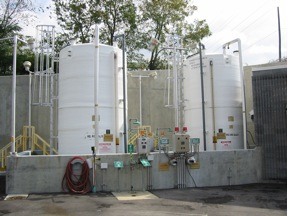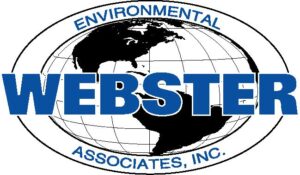Comparing Iron Salts to Other Odor Control Methods: Which is Right for You?
 Effective odor control is essential for wastewater and industrial operations. Uncontrolled odors can impact compliance, community relations, and facility performance. There are various options available, and each has unique strengths and applications. Iron salts are one of the most reliable and widely used methods for managing odors, particularly hydrogen sulfide.
Effective odor control is essential for wastewater and industrial operations. Uncontrolled odors can impact compliance, community relations, and facility performance. There are various options available, and each has unique strengths and applications. Iron salts are one of the most reliable and widely used methods for managing odors, particularly hydrogen sulfide.
At Webster Environmental Associates (WEA), we work with facilities to select the most effective odor control approach. With decades of experience, we help identify the right technology to meet specific operational needs.
Iron Salts vs. Other Chemical Treatments
Iron salts stand out for their ability to efficiently neutralize hydrogen sulfide. When added to wastewater, iron salts like ferrous chloride, ferrous sulfate, and ferric chloride react with hydrogen sulfide to form insoluble iron sulfides. These compounds are stable and do not release odors back into the environment.
In comparison, hydrogen peroxide is another popular odor control method. It works by oxidizing hydrogen sulfide into sulfur and water. While highly effective, hydrogen peroxide requires precise dosage and can lead to higher operating costs due to its chemical properties and handling requirements.
Magnesium hydroxide is another alternative. It raises the pH of wastewater, creating an environment where hydrogen sulfide cannot form. This method is beneficial in preventing odor formation but may not address existing odors as quickly as iron salts. Additionally, magnesium hydroxide is often more expensive and may require larger quantities to achieve similar results.
For facilities aiming to balance cost and performance, iron salts are often the most economical choice. They are widely available, easy to apply, and effective in managing odors and reducing corrosion risks.
Situations Where Iron Salts Are the Best Choice
Iron salts are particularly effective in facilities with high hydrogen sulfide concentrations. Wastewater treatment plants and industrial operations that handle organic waste often experience significant odor challenges. Iron salts can quickly and reliably address these issues.
Facilities with limited budgets or looking for cost-efficient methods often prefer iron salts. They offer a balance of affordability and effectiveness that is difficult to match. In locations where compliance with air quality and odor regulations is critical, iron salts provide consistent results. Their performance in neutralizing hydrogen sulfide helps facilities meet environmental standards while minimizing the risk of odor complaints.
Potential Limitations of Iron Salts
Despite their advantages, iron salts come with certain challenges. They are corrosive, which means proper handling and storage are essential. Facilities must use corrosion-resistant tanks and secondary containment systems to safely store and dose iron salts. Staff training on handling procedures is also necessary.
Seasonal variations can affect the performance of iron salts. For example, colder temperatures may slow down chemical reactions and require adjustments in dosage. Facilities must monitor seasonal changes and adapt their treatment plans to achieve consistent results.
Another consideration is the potential for sludge formation. The reaction between iron salts and hydrogen sulfide produces iron sulfides, which can increase sludge volumes in wastewater treatment systems. Proper sludge management is necessary to prevent operational inefficiencies.
Why WEA Recommends the Right Technology for Every Facility
 Choosing the right odor control method depends on a variety of factors. At Webster Environmental Associates, we provide independent consulting to help facilities navigate their options. We conduct thorough site evaluations to understand the specific odor challenges each facility faces. Our team uses data-driven methods to recommend the best approach, whether it’s iron salts, hydrogen peroxide, magnesium hydroxide, or another technology.
Choosing the right odor control method depends on a variety of factors. At Webster Environmental Associates, we provide independent consulting to help facilities navigate their options. We conduct thorough site evaluations to understand the specific odor challenges each facility faces. Our team uses data-driven methods to recommend the best approach, whether it’s iron salts, hydrogen peroxide, magnesium hydroxide, or another technology.
We have a proven track record in implementing effective odor control systems. With experience across more than 750 projects, we know which methods work best in different scenarios. Our team ensures each system is optimized for performance and long-term reliability.
WEA also provides ongoing support after implementation. We help facilities monitor their systems, adjust treatment plans as needed, and train staff to maintain efficient operations. This commitment to long-term success sets us apart in the odor control industry.
Reach Out Today to Learn More About Iron Salts
Iron salts remain a reliable and cost-effective option for many facilities managing odor challenges. Their ability to neutralize hydrogen sulfide and meet regulatory requirements makes them a preferred choice in wastewater and industrial operations. However, every facility is unique, and selecting the right method requires careful evaluation.
At WEA, we help facilities find the most effective odor control strategies. We use our expertise and unbiased recommendations to make sure your operations remain efficient, compliant, and odor-free. Contact us today to learn more about how iron salts or other technologies can improve odor management at your facility.
